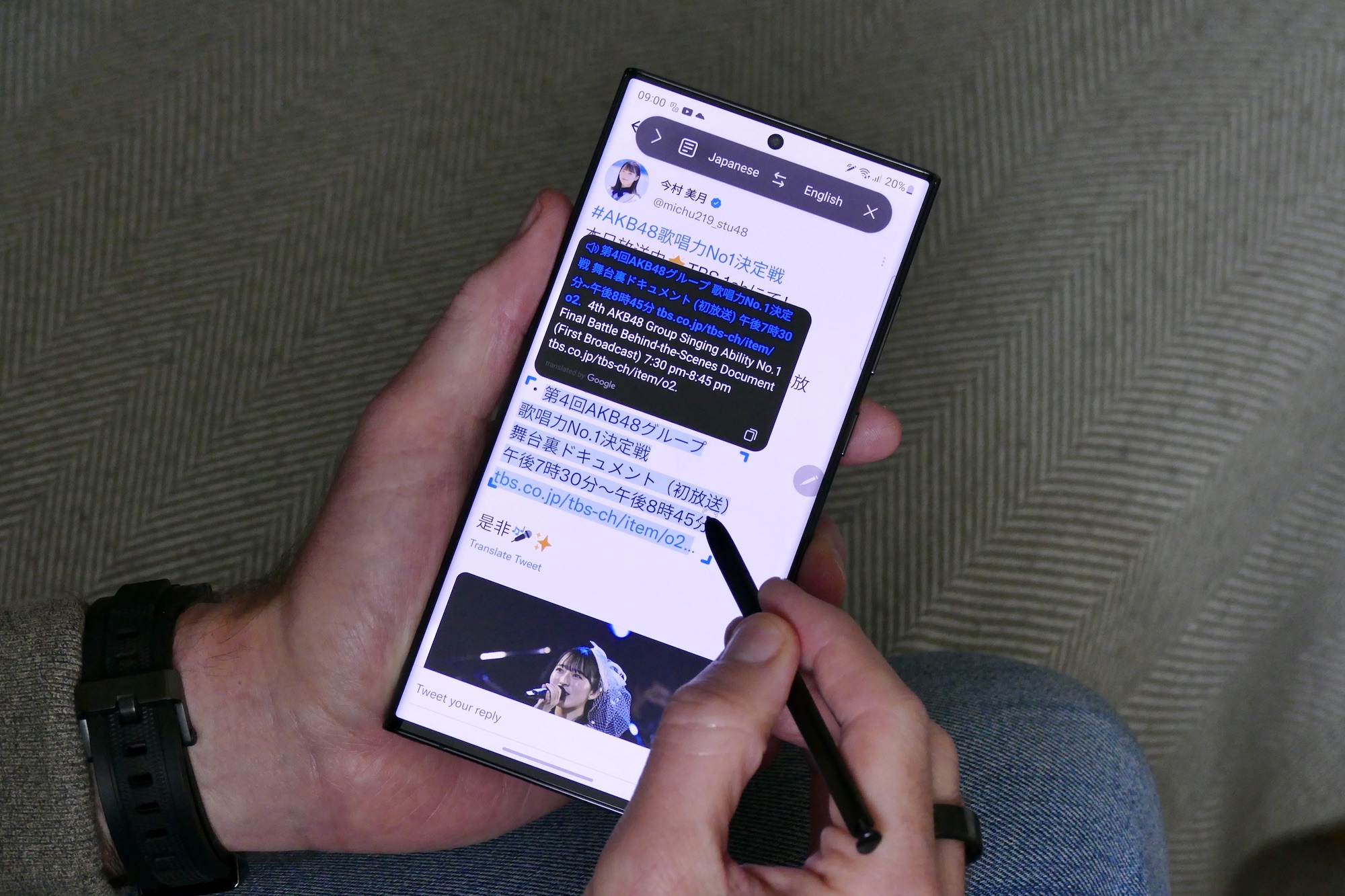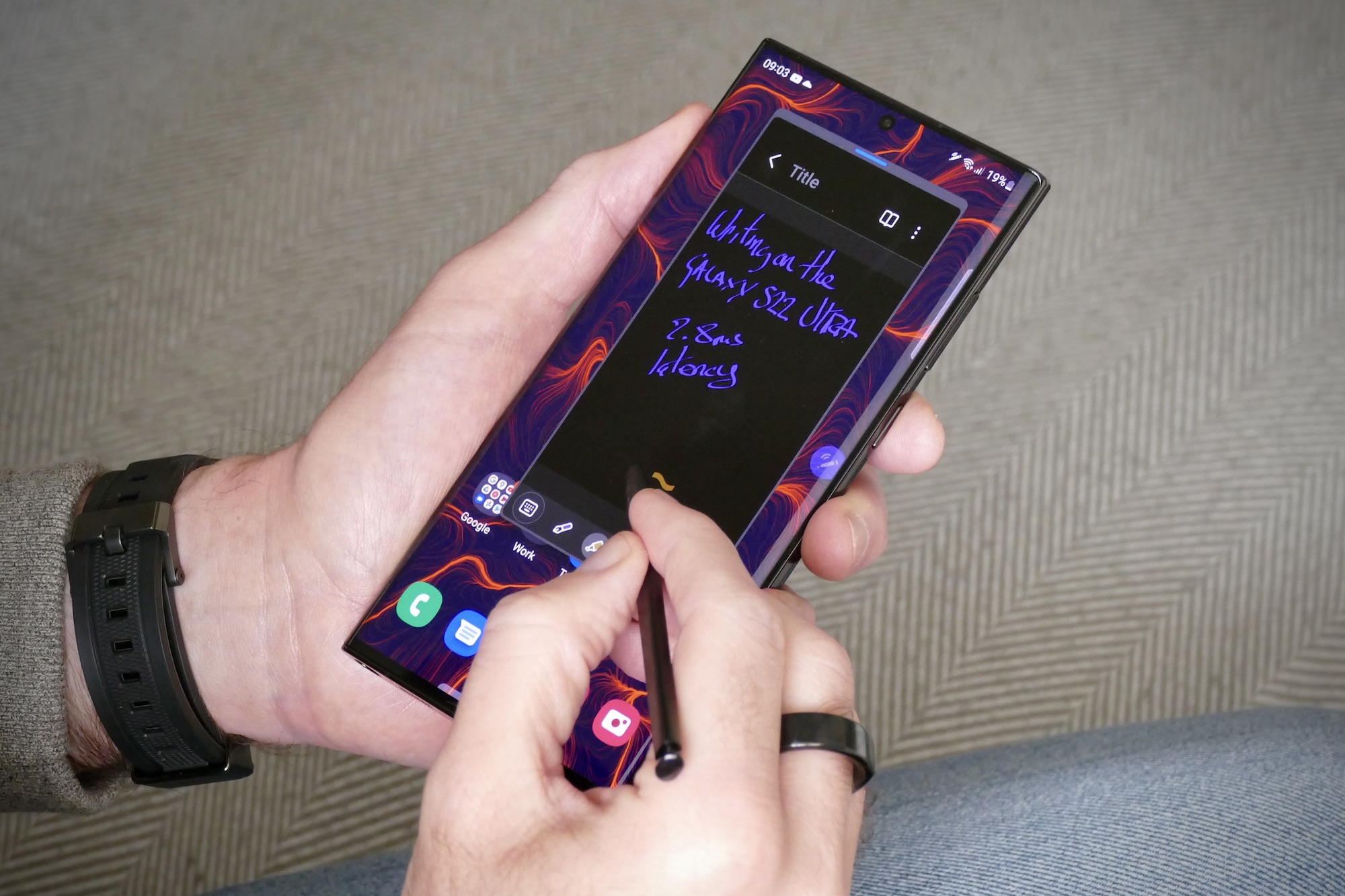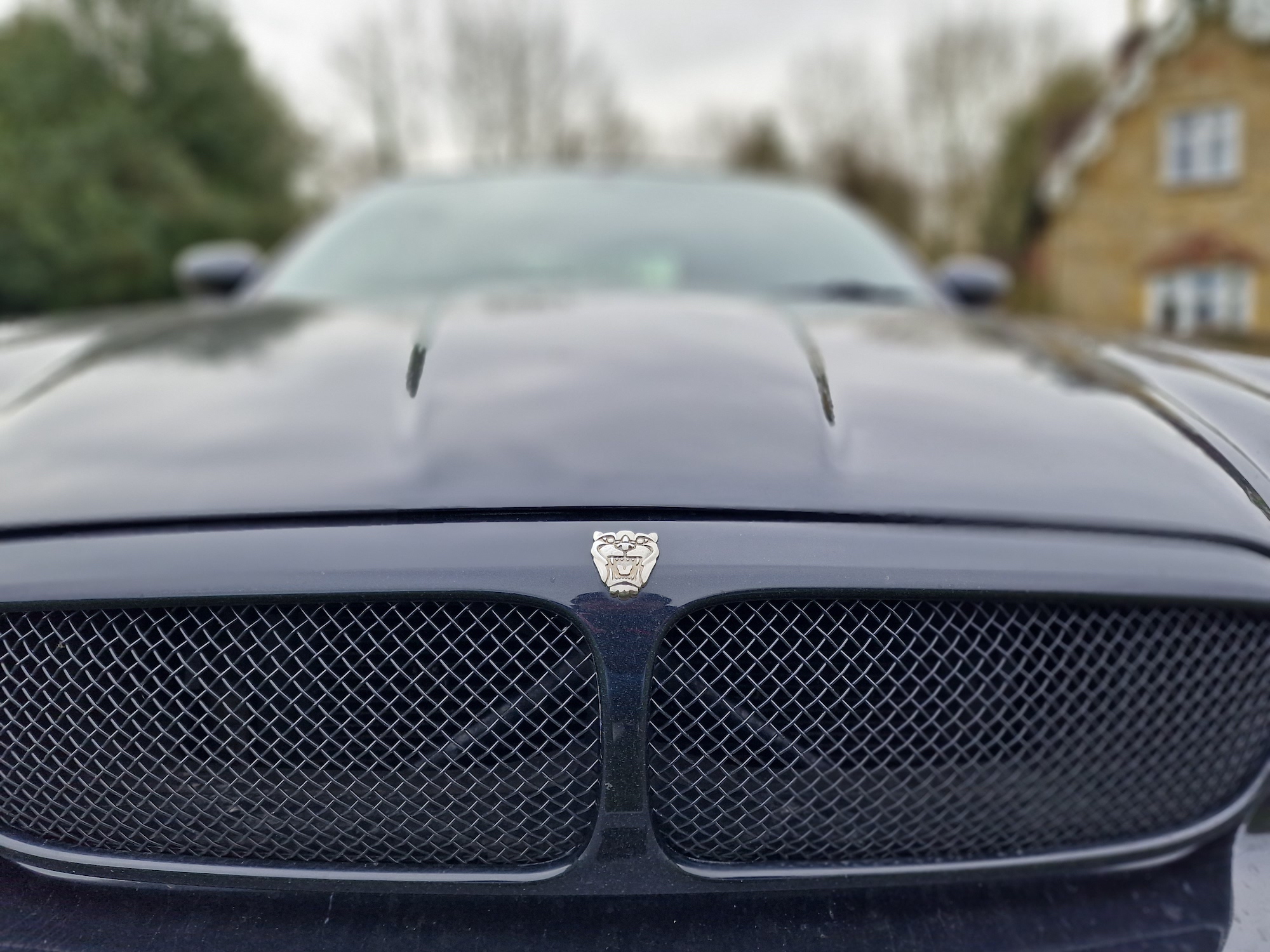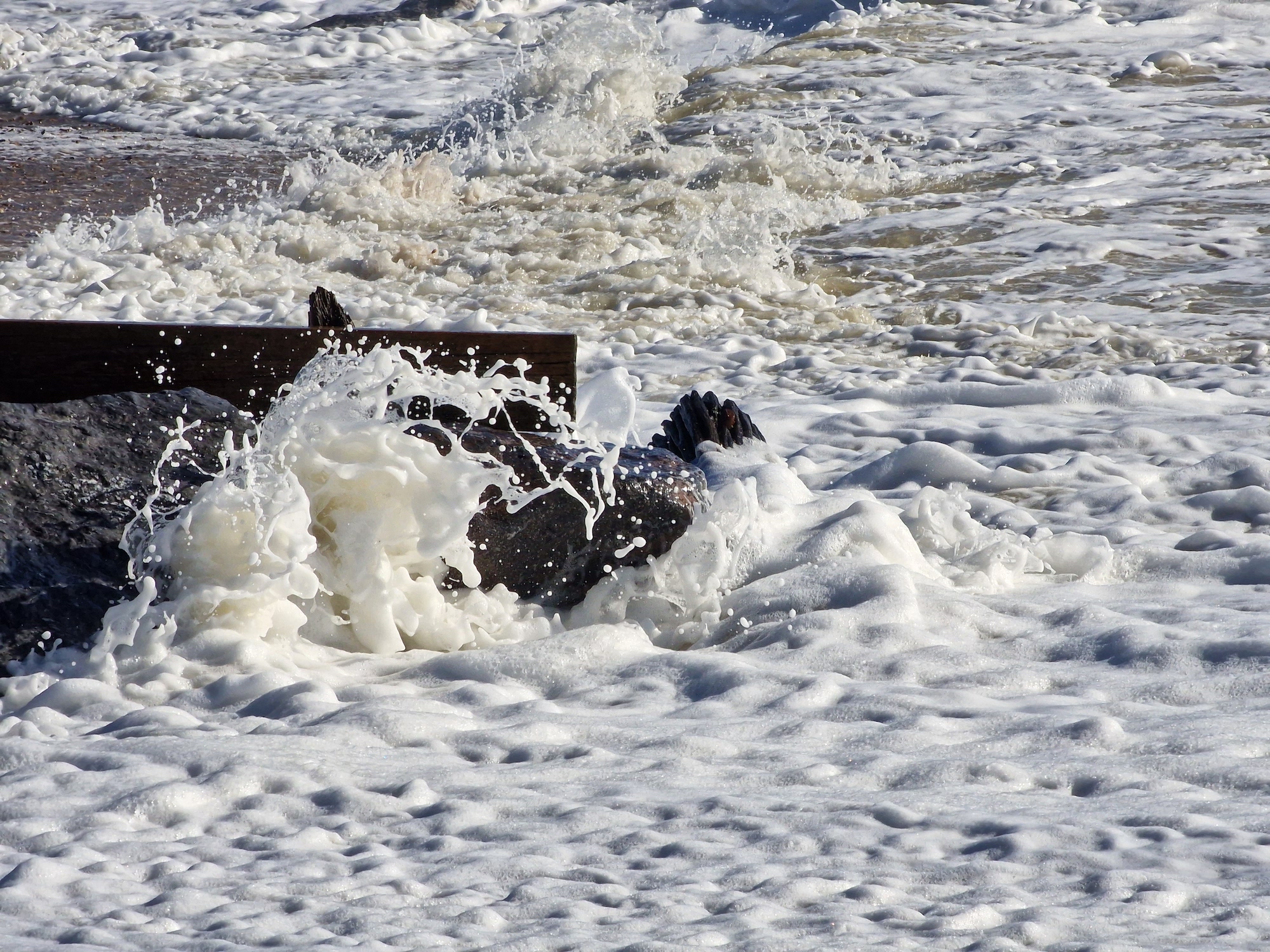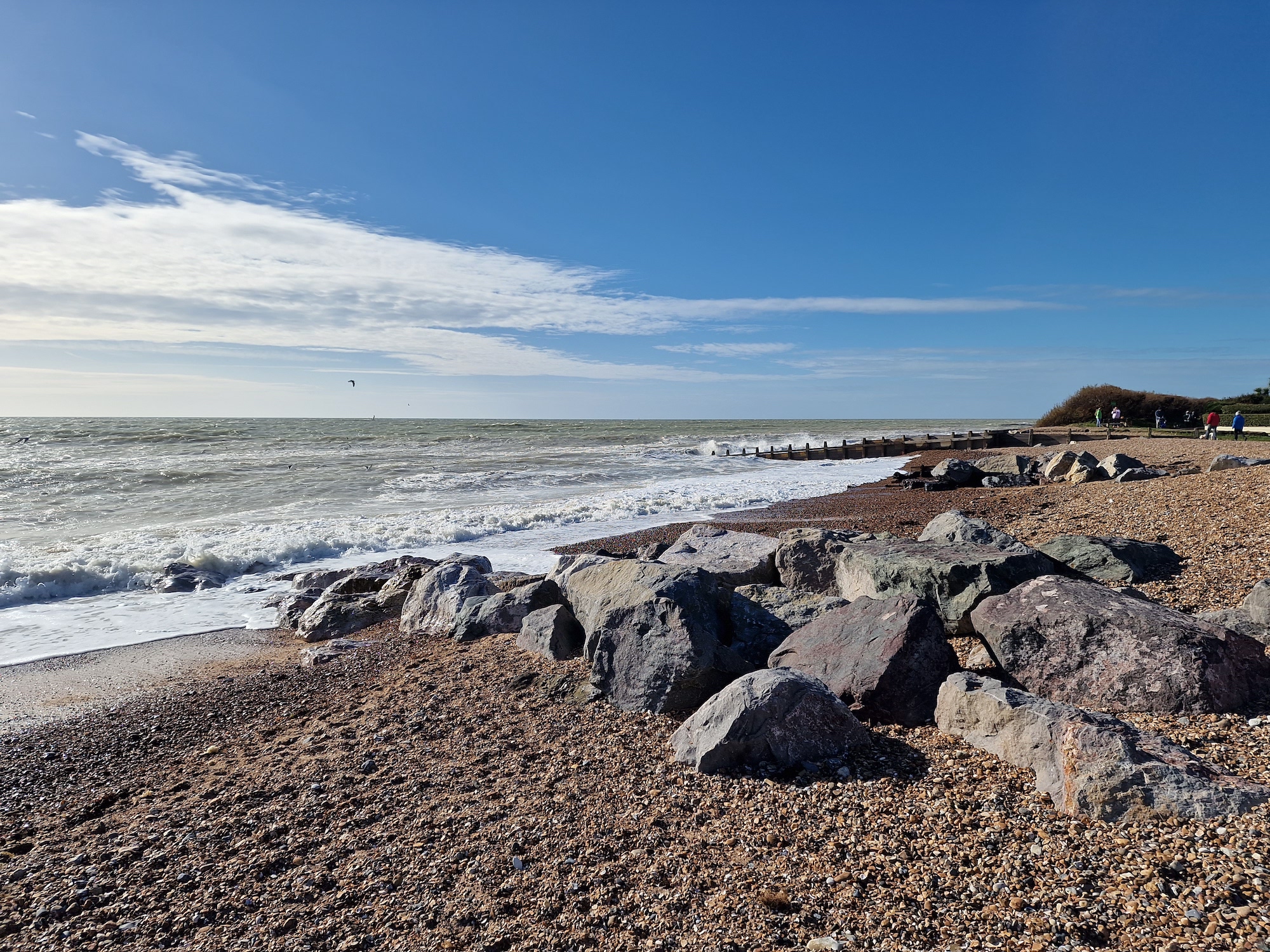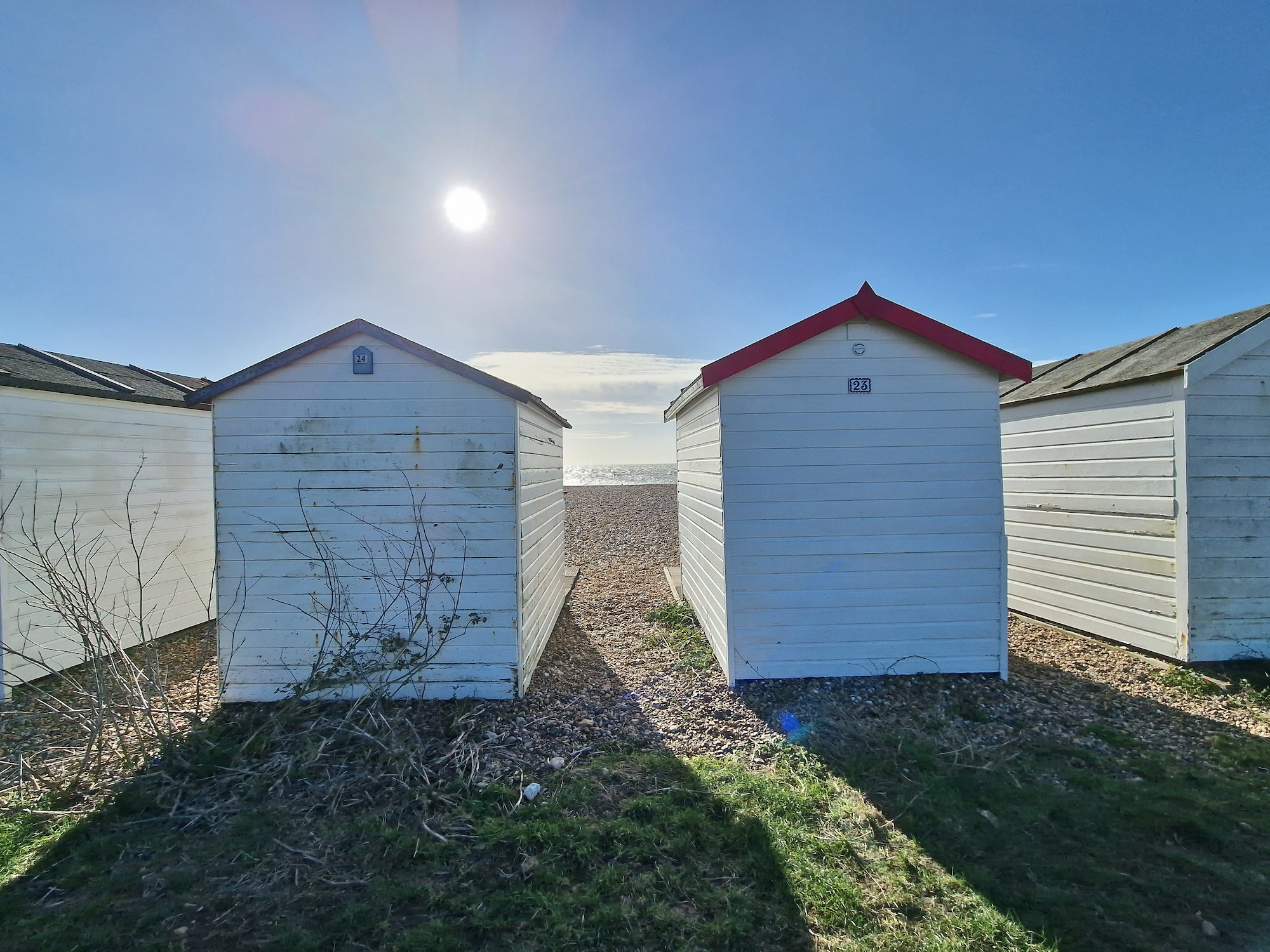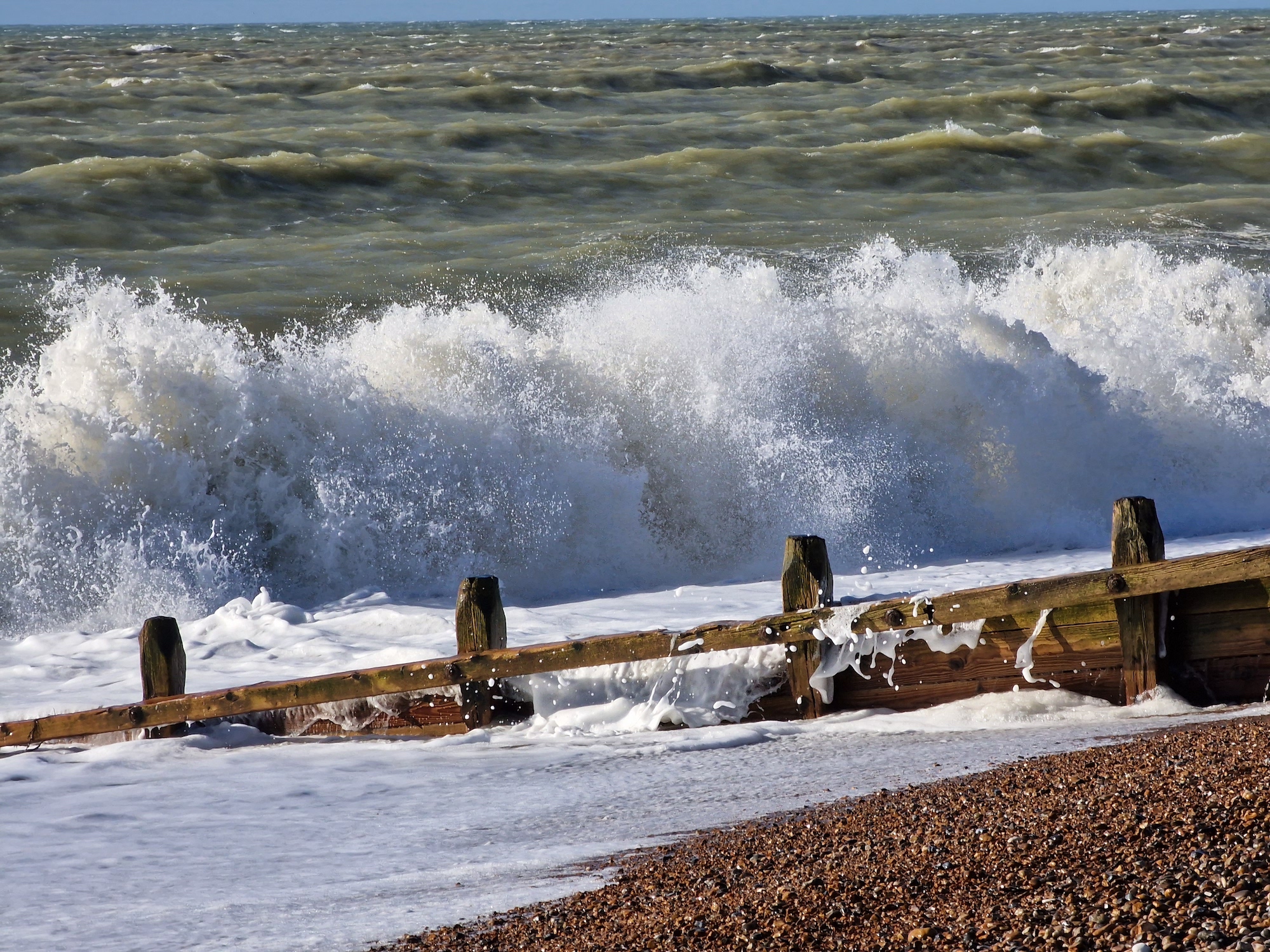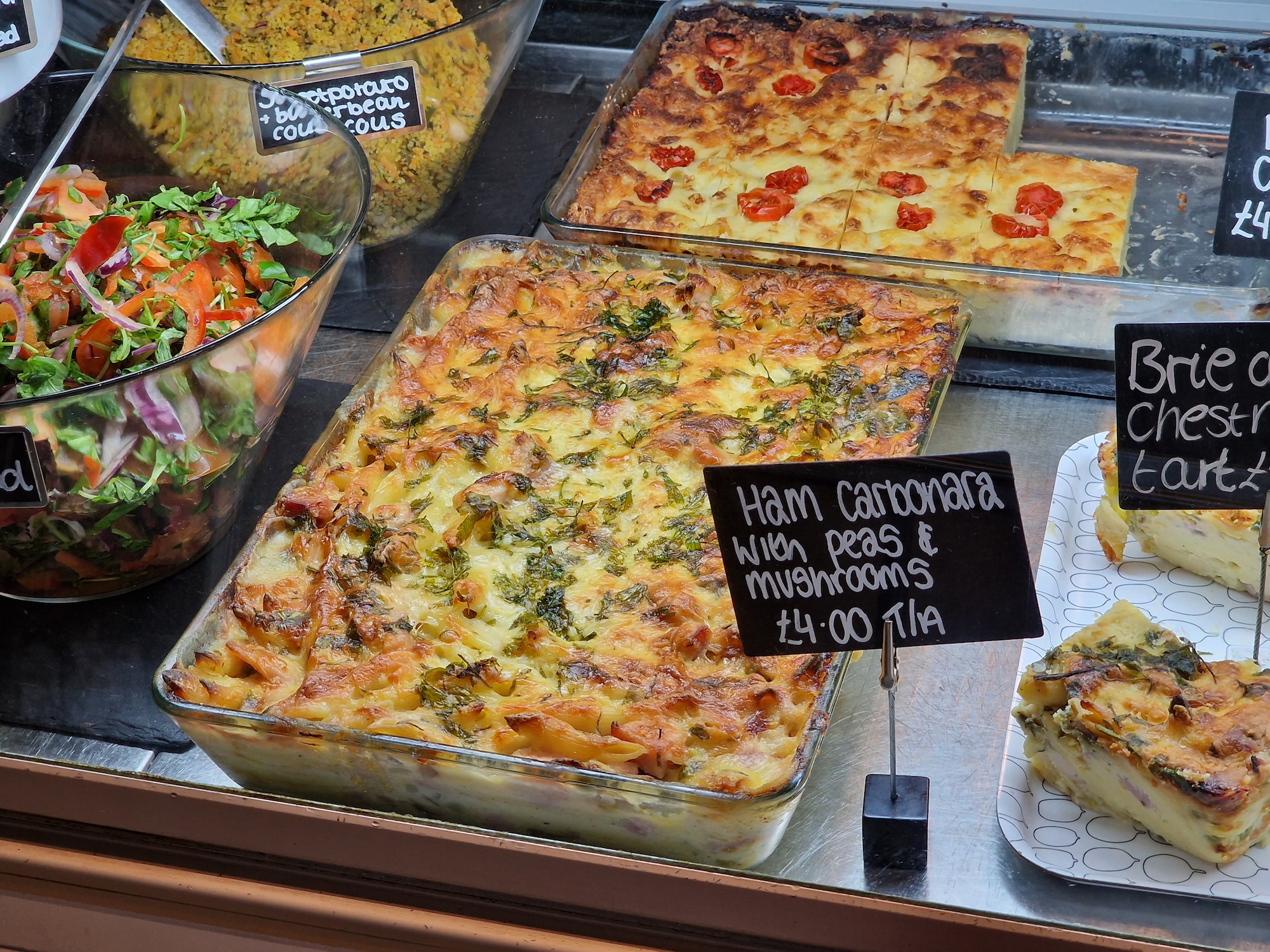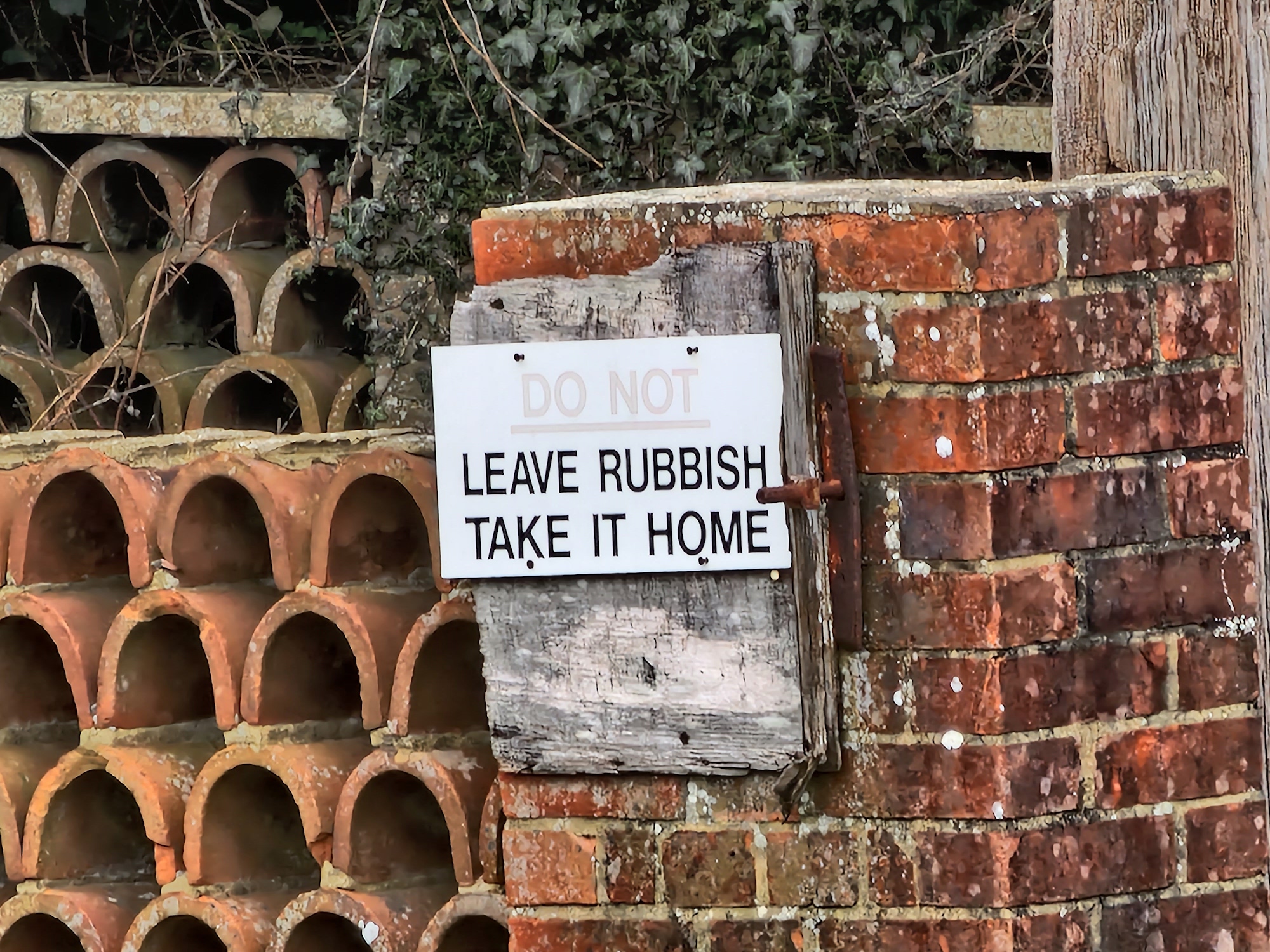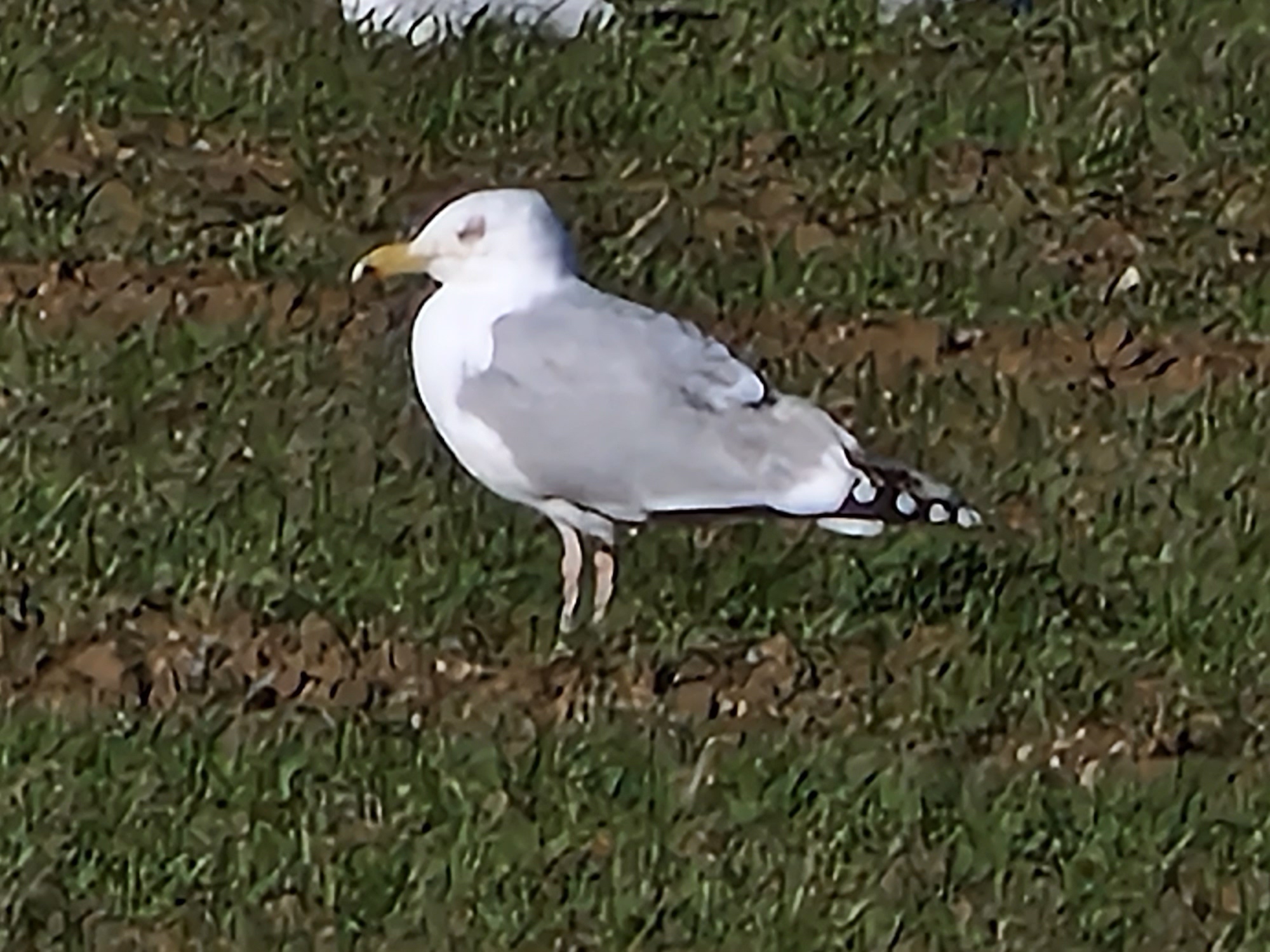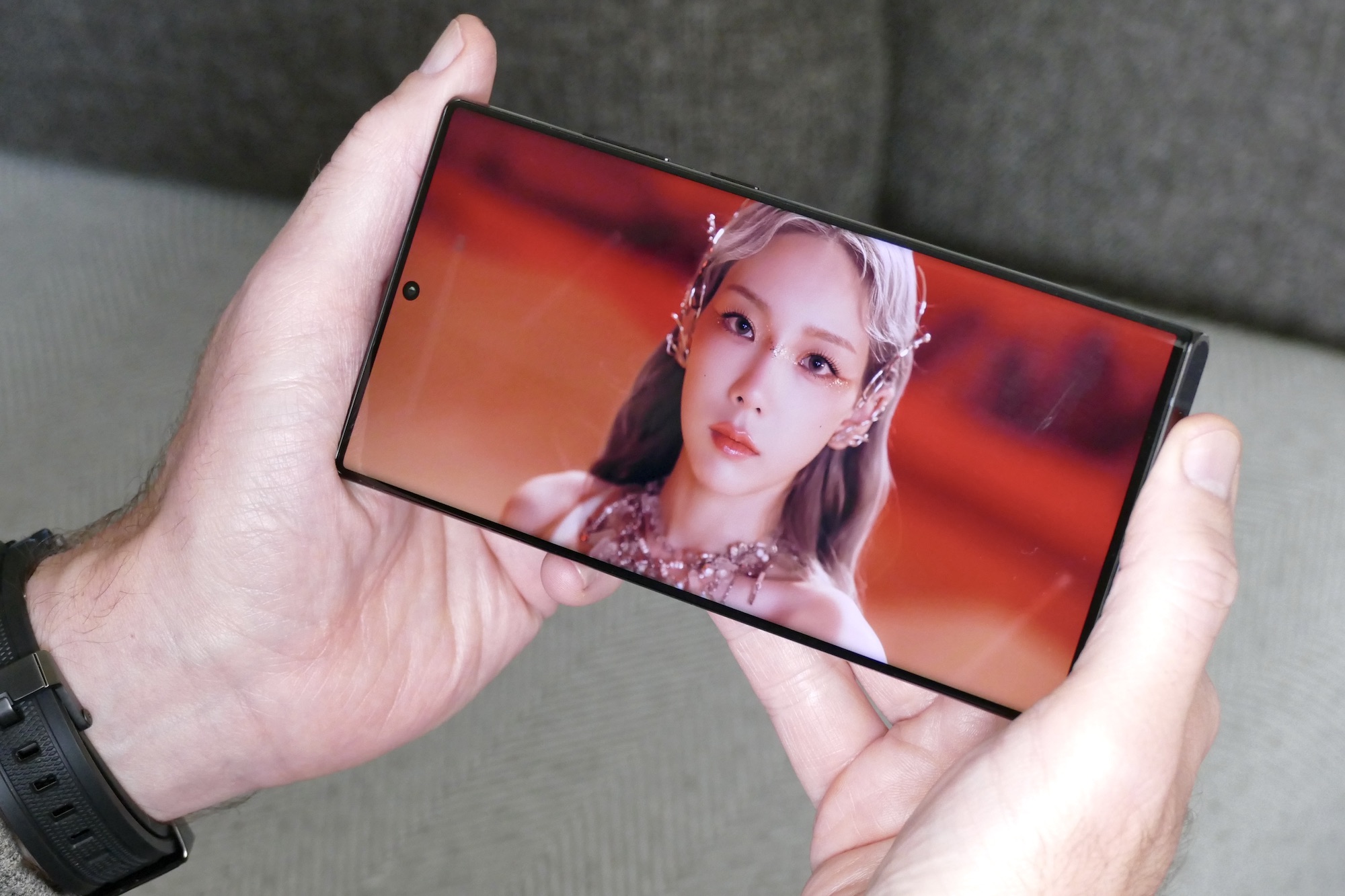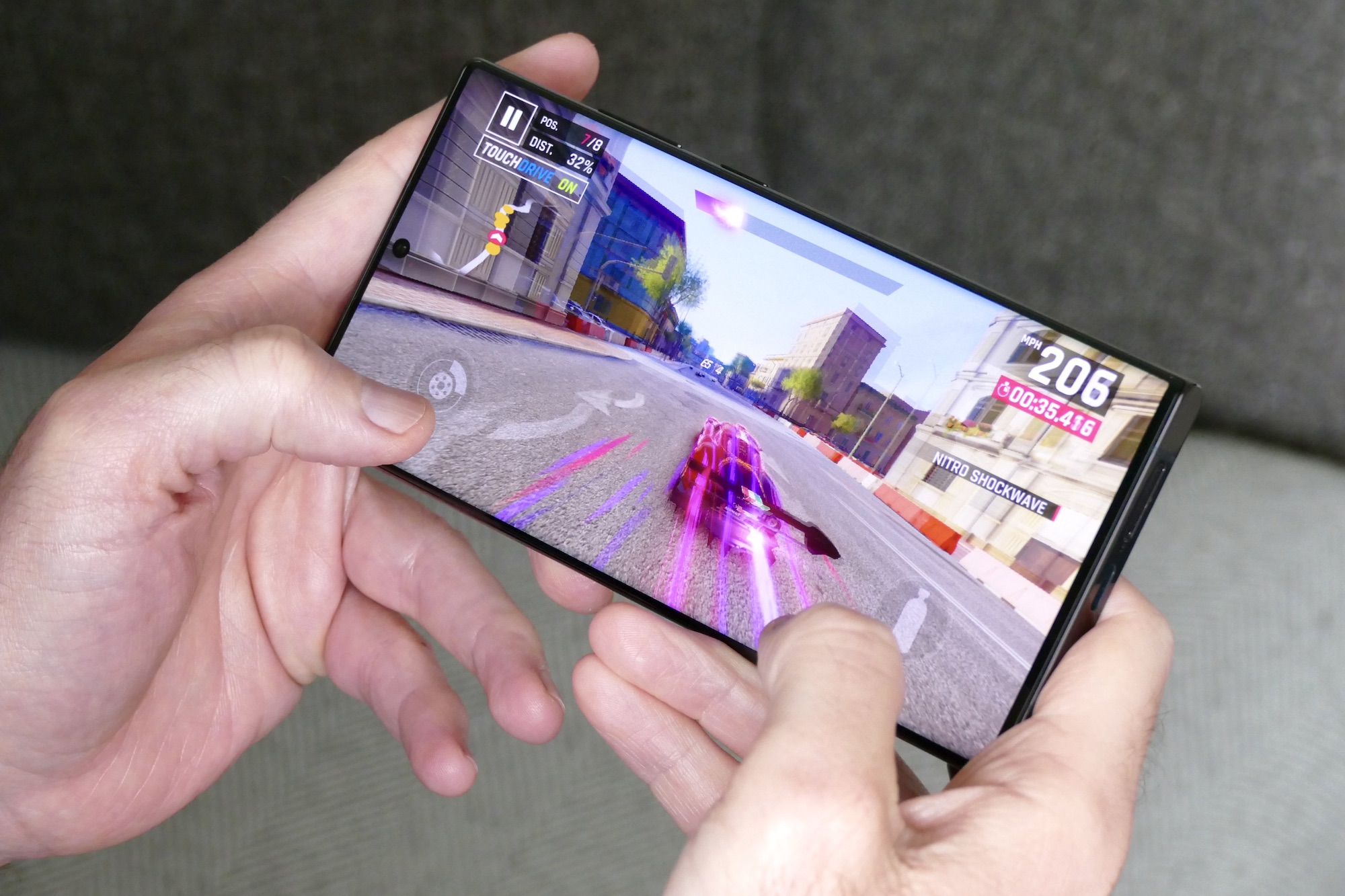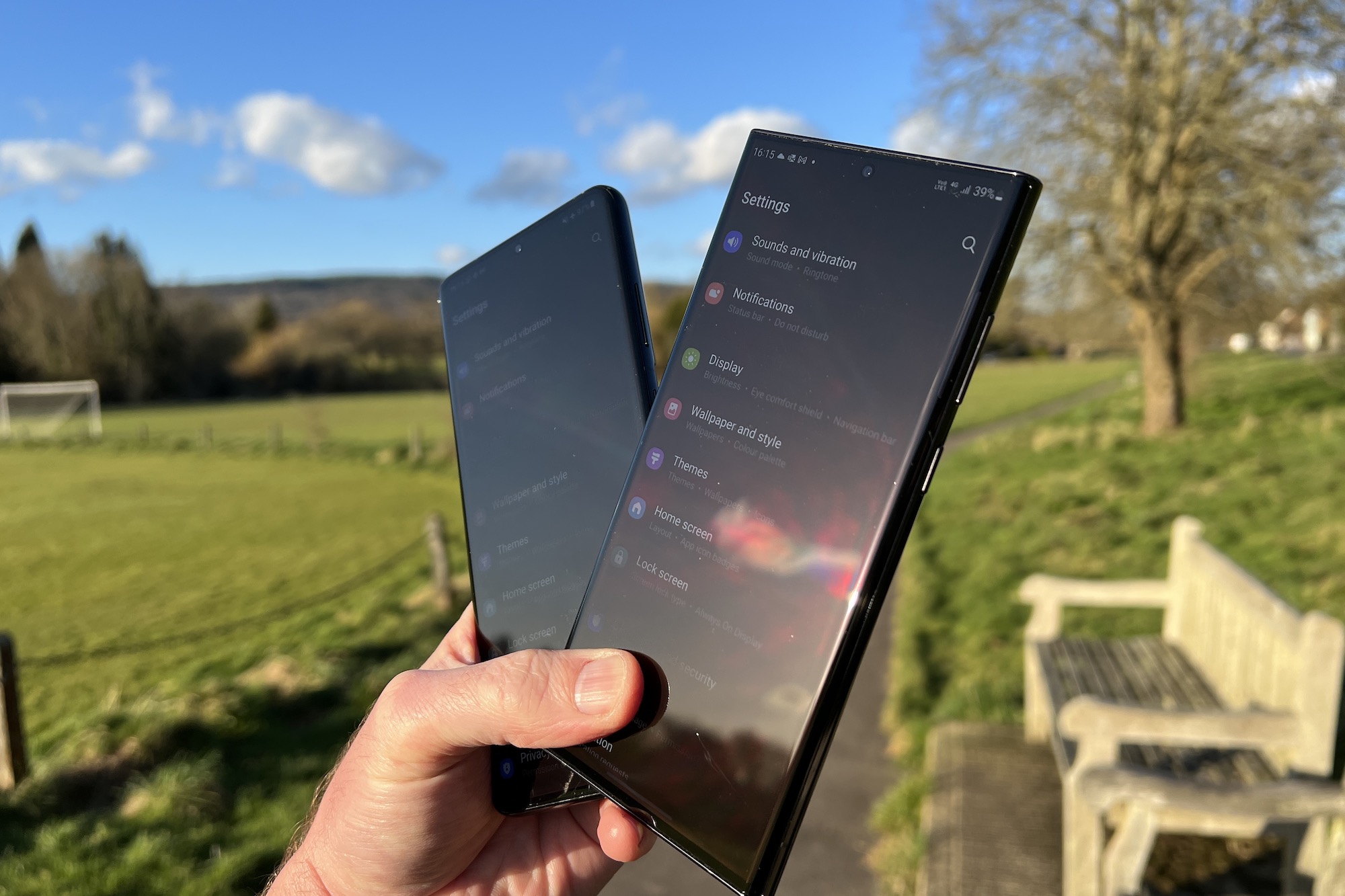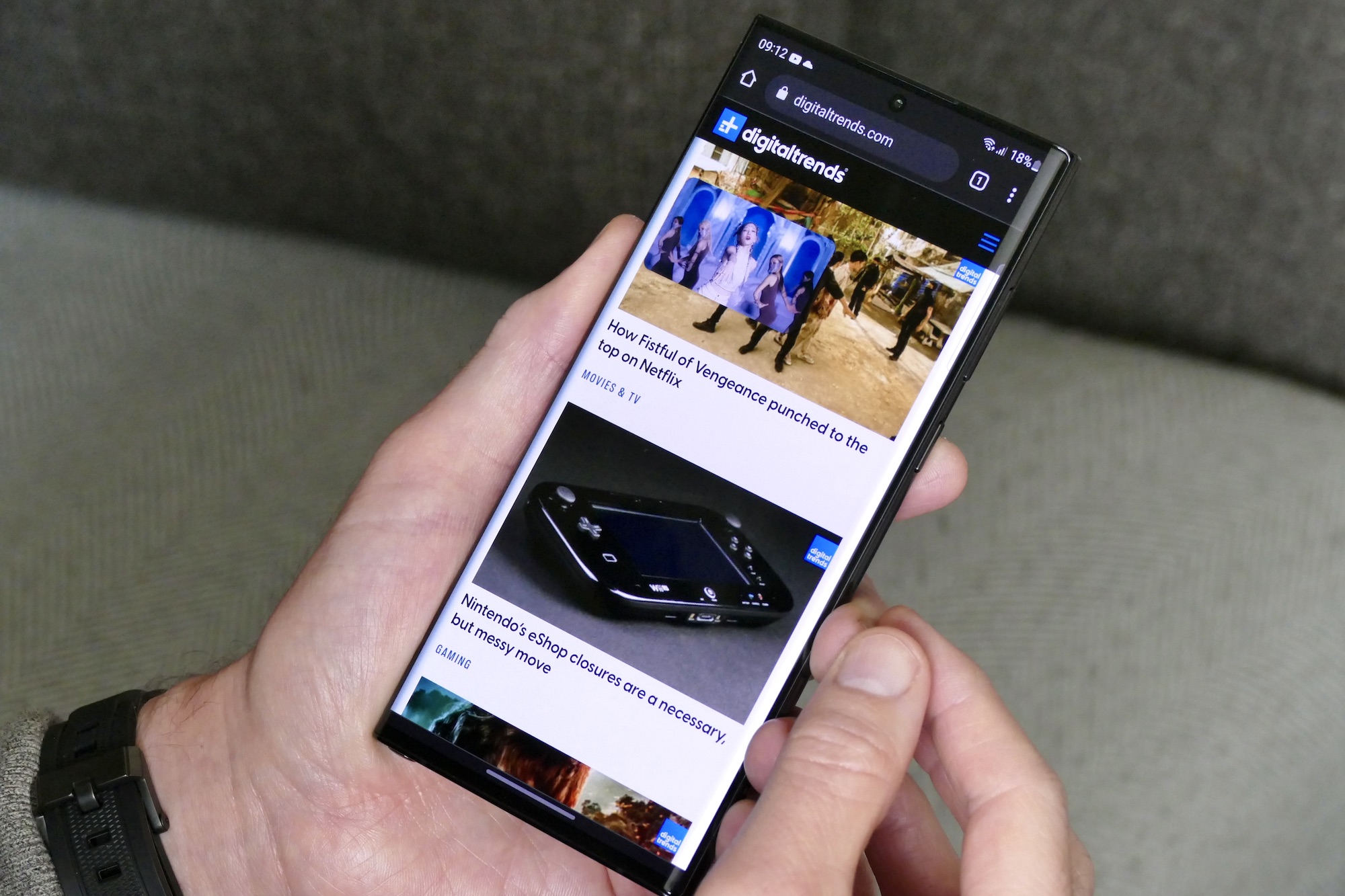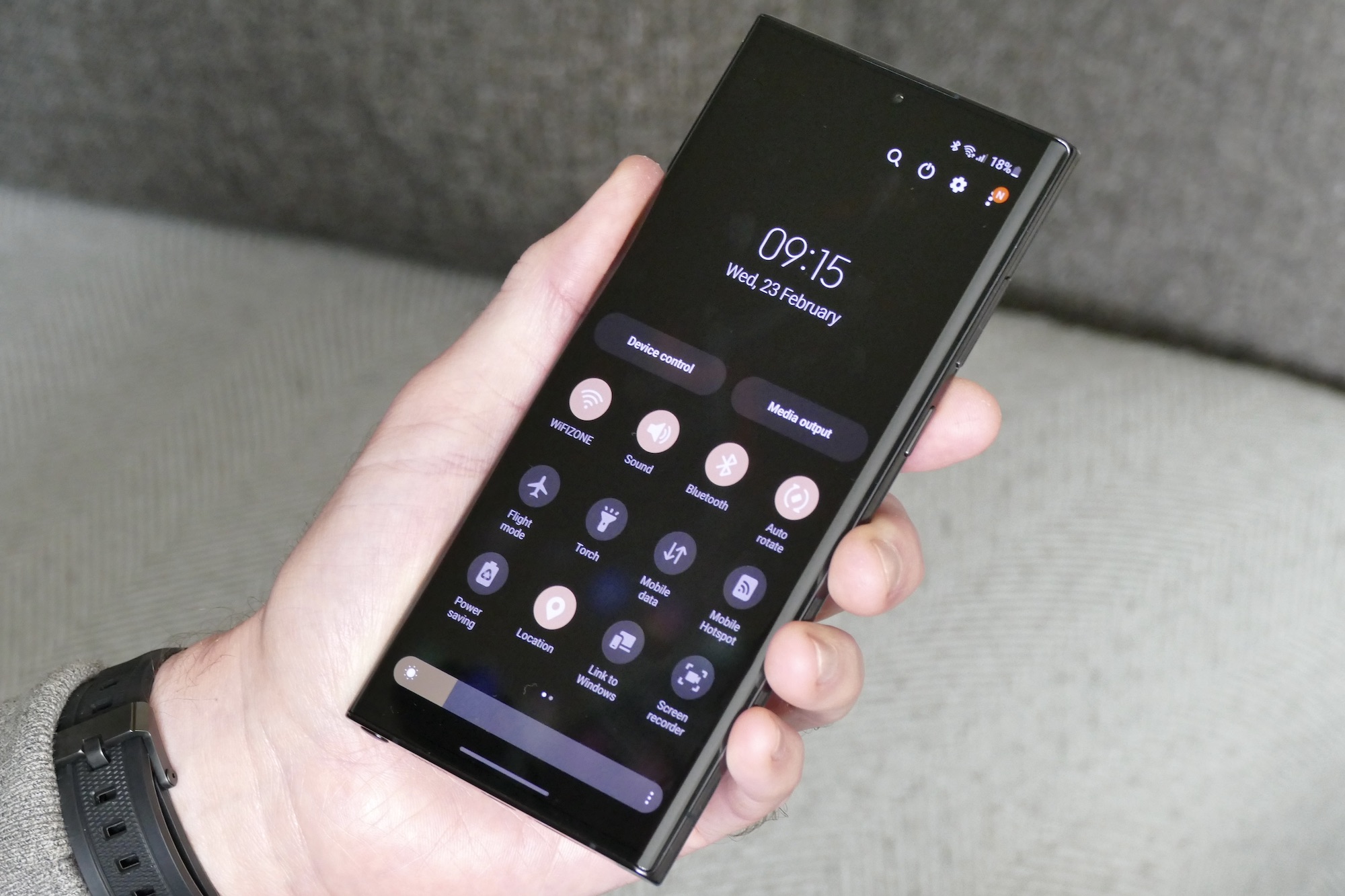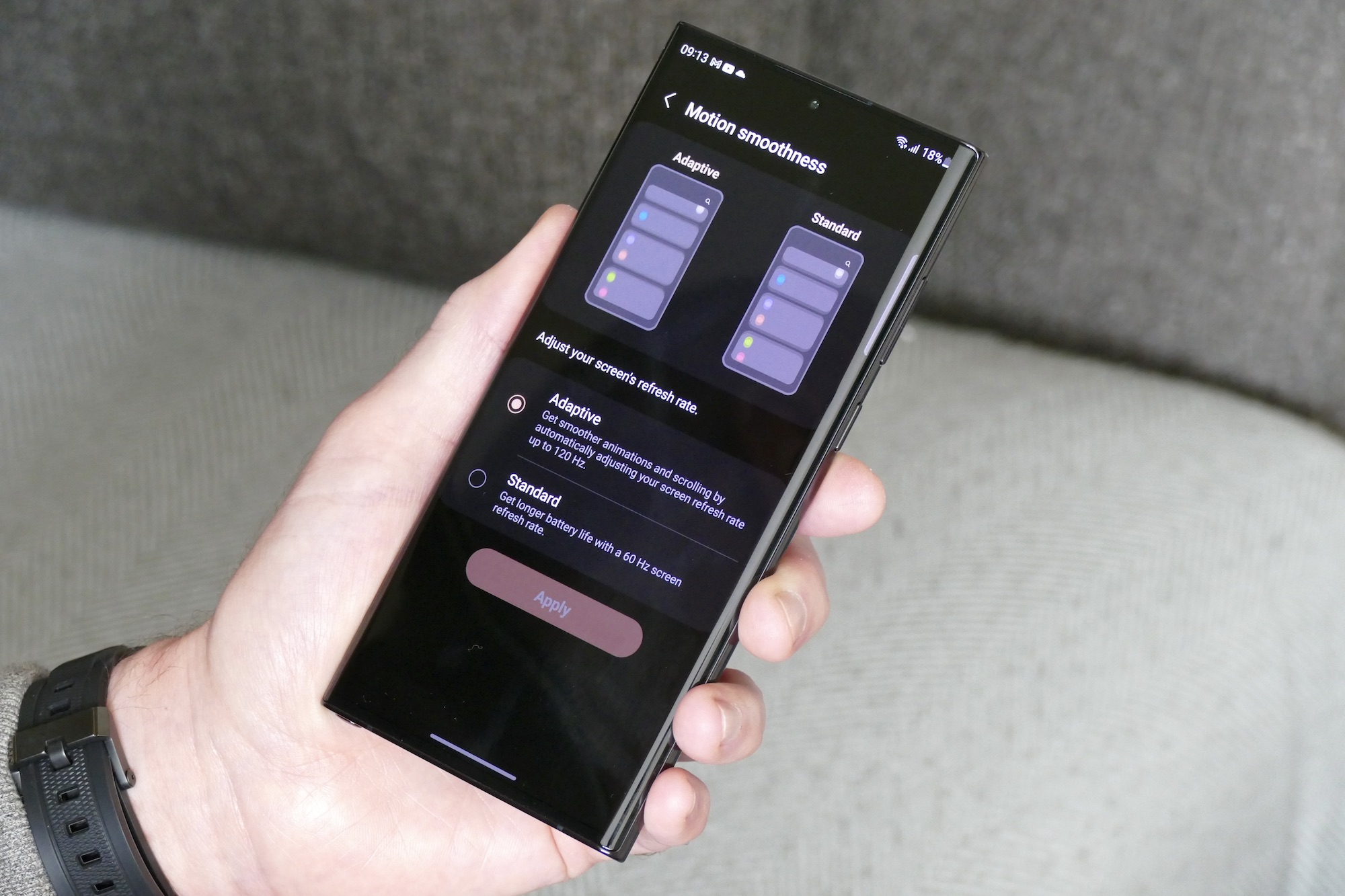“The Galaxy S22 Ultra is astonishingly capable in almost all aspects, from camera to productivity, and you probably won't need to consider upgrading for years.”
- S Pen is convenient and highly accurate
- Versatile camera takes great photos
- The latest processor for power
- Long software support
- Beautiful high refresh rate screen
- Not very fast battery charging
- Large and heavy
Editor’s note: The Samsung Galaxy S23 and Galaxy S23 Ultra are now official, so you may want to hold off …
Is the Galaxy S22 Ultra for productivity-focused people who miss the Galaxy Note, or for people who loved the Galaxy S21 Ultra and its incredible camera? Or is it for both, or an entirely new set of people? The S22 Ultra combines much of what we love about the Galaxy Note 20 Ultra and the Galaxy S21 Ultra, so getting confused about it is understandable, but don’t be. Think of this heavyweight technology powerhouse as practically all the phone you’ll need for the next few years regardless of what you want to do with it, and you’ll have it figured out. There’s a lot to talk about here, so let’s dig in.
Design
The Galaxy S22 Ultra is very serious, especially in the Phantom Black color you see in our photos. It’s not quirky or a bit playful like the Galaxy S21 Ultra or even its other S22 family members, the Galaxy S22 or S22+ phones, which share no design similarities with it apart from being smartphones. It’s all business with its flat end caps, sharp lines, and squared-off corners. Its overall design has definitely been influenced more by the Galaxy Note 20 Ultra than the S21 Ultra.
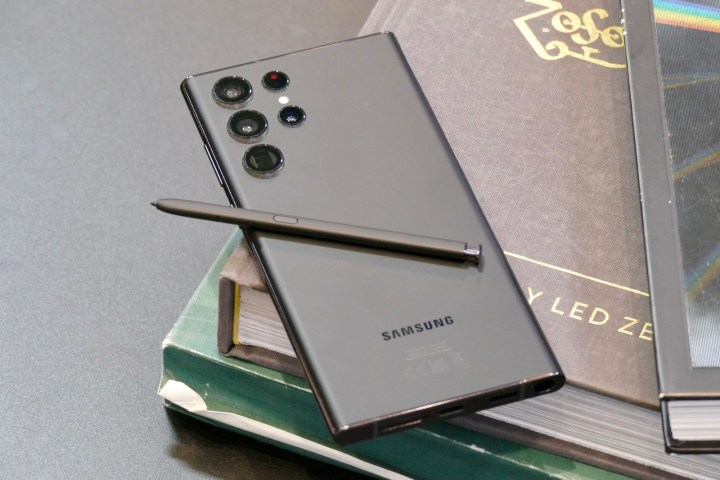
It’s as tall as the Galaxy S21 Ultra and Google Pixel 6 Pro, but several millimeters wider than both, and at 228 grams, it’s one of the heaviest smartphones you can get. The sides are sharply curved, the square corners are unforgiving in the way they dig into your palm, and the nearly 9mm thick body all mean it’s really not the most comfortable phone to hold, especially with one hand. A year ago, we probably never considered that the Galaxy S21 Ultra — a giant of a phone — would be more hand-friendly than any sequel, but it absolutely is.
You’ll have to make it even bigger if you want it to last. The flat screen and (mostly) flat rear panel mean it’s quite slippery, and due to the size and weight, I do think it’ll take a few potentially damaging tumbles, so wrap it in a case if you plan to keep it for a few years. The matte black finish doesn’t attract fingerprints, but if it’s anything like the S21 Ultra, it’ll be prone to scuffs and marks, which affect its attractiveness over time.

The integrated camera module from the Galaxy S22 and S22+ has not been included in the design here, and the camera lenses are all individually set in the back panel. It’s minimalist and quite pretty, but also prone to being messy as dust and lint gather around each one.
Does it sound like I’m coming down hard on the S22 Ultra? I’m not really. The Galaxy S22 Ultra is beautifully made, every panel and line is millimeter perfect in its fit and finish, and if you choose it in one of the other colors — burgundy is beautiful — it does lose some of its seriousness. But I do think it’s important for anyone considering this phone to understand how it’s not the friendliest of designs, and not the easiest of phones to wrangle on a daily basis either.
S Pen
The Galaxy S22 Ultra comes with an S Pen stylus inside a special storage slot on the bottom of the phone, and it’s identical to the system used on the Galaxy Note 20 Ultra. The S Pen is shaped the same too, in that it’s quite small and thin, and isn’t especially comfortable to hold if you have big hands. It connects to the phone using Bluetooth, and its internal battery is charged when it’s docked inside the phone.
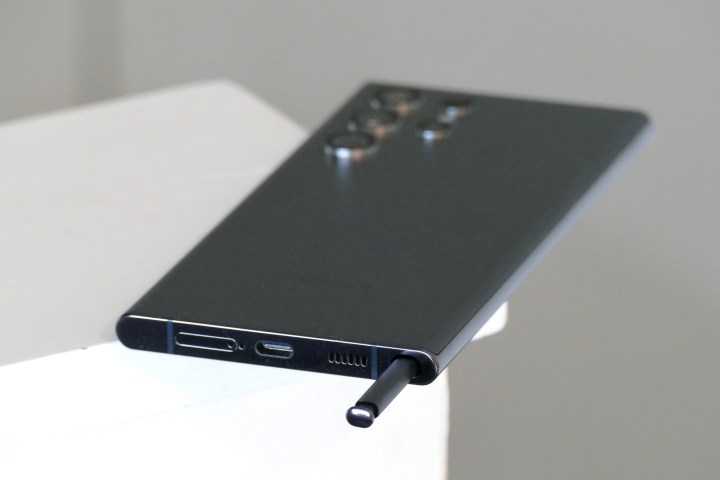
You have to make a point of extracting the S Pen, so there’s no chance of doing it accidentally, and when you do take it out, the corresponding menu immediately appears on the screen. You can do various different things with it, including creating notes, scribbling on the screen, automatically translating text, and creating fun, artistic images for use in things like Instagram Stories. It can also double as a remote shutter for the camera.
Samsung has reduced the S Pen’s latency to 2.8 milliseconds, and it really does feel instantaneous. Comparing it directly with the Galaxy Note 20 Ultra’s S Pen, which has a 9ms latency, you can actually tell the difference. There’s a delicate immediacy to the S22 Ultra’s S Pen, and it means you take neater notes and interact with the stylus and the screen more naturally. I’m no artist, but I imagine anyone with talent here will find it a joy to use.
But for everyone else, it’s debatable as to when or even if you’ll ever use it. It’s definitely useful, but unless you draw or take notes every day, it’s probably not going to be useful all that often. I like the translation feature and the remote shutter action, but these aren’t called into action often. I’m happy the features are there, but if they weren’t, I probably wouldn’t really notice. However, this doesn’t change the fact the S Pen works exceptionally well and is a refined and convenient piece of tech if you regularly reach for a stylus.
It’s also part of what makes the S22 Ultra a little confusing. The S Pen is an outright productivity-focused feature, and it made the Note series so beloved by those less interested in cameras and gaming. The S Series has never really been about that, and instead has focused on great cameras, a slick design, and outstanding media ability. Has that been sidelined? Let’s continue.
Camera
This is still a great camera phone. In fact, it’s still one of the very best camera phones you can get, but it is not a massive step forward over the Galaxy S21 Ultra, or even the Galaxy Note 20 Ultra in places. Samsung has improved the 3x, 10x, and 30x zoom levels, providing greater detail and more natural and accurate colors, but the main and wide-angle cameras give much the same results as the cameras on both those predecessors.
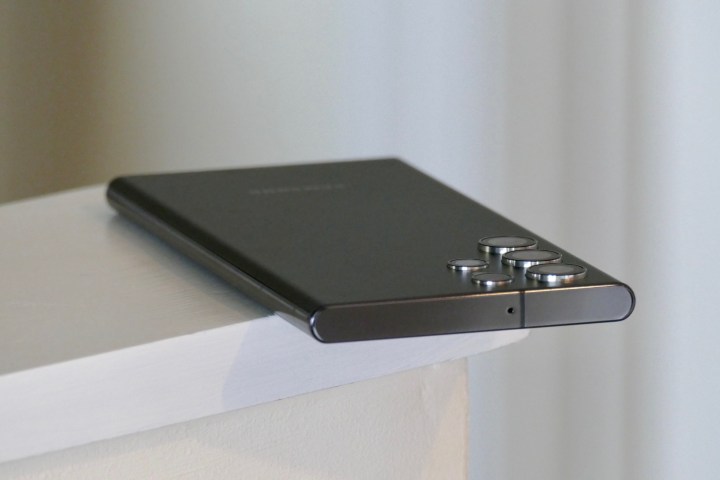
I haven’t come across a situation where the Galaxy S22 Ultra’s camera won’t do the job. The variety of high-quality optical zoom modes makes it hugely versatile, the main and wide cameras take beautiful photos with vibrant colors and excellent balance, and the newly updated portrait mode is very effective. The app is simple and easily customized, so you can quickly access the features you use most.
Where does it stunble? Work still needs to be done on the color accuracy and exposure at the 3x and 10x zoom settings, the selfie camera can produce soft photos and isn’t particularly good in lowlight, and there is evidence of edge enhancement when you look closely at the zoom photos. But none of these things take much away, and many people won’t examine the photos so carefully that they’ll even notice because when it comes to taking shareable photos quickly, the S22 Ultra is an excellent partner.
Single Take mode is a great example of why. You take a short video up to 15 seconds long, which on the S22 Ultra can be extended by another five seconds if you need it, and the phone’s A.I. generates multiple images and videos from it. For example, you get a highlight video, a few filtered images, a fast-forward or slow-motion video, and a boomerang video of a highlight. It takes seconds for these clips to be generated, and they can all be edited and shared.
I like Single Take because you concentrate on shooting the scene, not what mode to use to best capture it. Samsung has also worked with social networks Snapchat and Instagram to include its camera tools in their apps, so you can directly use the different cameras and modes without shooting in the S22 Ultra’s camera app and then losing quality when importing them.
I doubt you’ll come across a time where the Galaxy S22 Ultra won’t take a brilliant photo.
For the more technically minded, Samsung has a Pro mode for stills and video, plus a new Expert RAW app available to download from the Galaxy Store. Expert RAW provides control over the telephoto cameras, supports HDR capture, and allows data to be saved as lossless files ready to edit in apps like Adobe Lightroom. In the same way, the S Pen takes the Galaxy S22 Ultra beyond being just a big-screened phone, a variety of pro-level camera modes provide more opportunities for those happy to get to grips with the intricacies of photography.
The 108MP mode has gained a little more functionality with the Detail Enhancer. It uses Samsung’s A.I. to increase detail, sharpness, and color in these gigantic photos, and it’s very effective. The 108MP photos are huge at 12,000 x 9000 pixels and take up about 25MB each, but the Detail Enhancer makes cropping down to a good-quality smaller image very easy. Take a look at the examples above. Do remember the main photos have been reduced in size to make them web-friendly.
I doubt you’ll come across a time where the Galaxy S22 Ultra won’t take a brilliant photo, regardless of your own personal skill level. There’s also great potential for growth due to the Expert RAW mode,and the overall versatility of the different modes and cameras. You can see a gallery of photos taken with the Galaxy S22 Ultra above, and for more in-depth examination of its skills, take a look at our comparison with the Galaxy S21 Ultra, the Galaxy Note 20 Ultra, and the Apple iPhone 13 Pro.
Screen
The Galaxy S22 Ultra has a 6.8-inch Dynamic AMOLED screen with a 120Hz refresh rate and a maximum resolution of 3088 x 1440 pixels. It supports HDR10+ and is covered in Gorilla Glass Victus+, plus it has a peak brightness of 1,750 nits. For reference, most phones hover around the 1,000 nits of brightness level. This is enabled by a feature Samsung calls Vision Booster, and it’s designed to improve outdoor viewing, especially in sunshine.
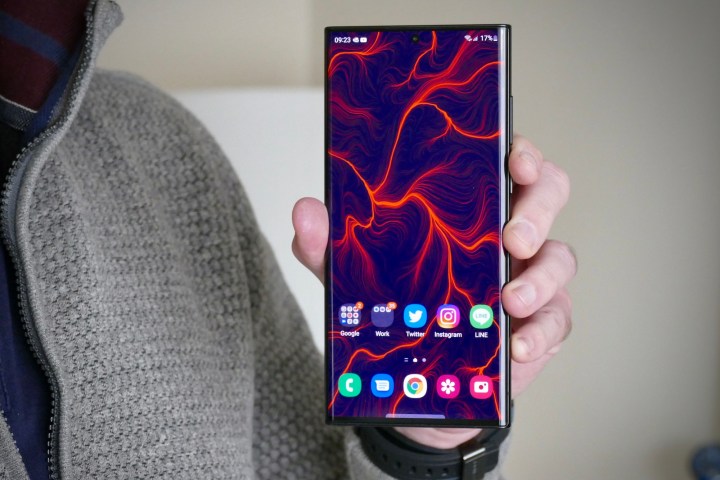
A comparison doesn’t reveal much difference when viewing straight ahead, perhaps it’s a little brighter with slightly crisper whites, but there’s a definite improvement when viewing at an angle in bright conditions. It’s hard to capture, but the photo on the right in the gallery below shows it next to the Galaxy S21 Ultra, and it’s quite clear the S22 Ultra’s screen is more legible.
This aside, I can’t see any real difference between the S22 Ultra’s screen and the S21 Ultra’s, but this isn’t a negative. The Galaxy S22 Ultra’s massive screen is glorious, showing stunning colors, deep blacks, and all the features you need — including HDR10+ and Dolby Atmos — for a wonderful multimedia experience. Sound is delivered through stereo speakers, and there’s a helpful equalizer feature to tune the audio to your liking. I found switching it to Pop most effective, but while there’s plenty of volume and clarity, plus very little distortion even at full volume, there’s not much bass at all.
Software and performance
I’m using the U.K. version of the Galaxy S22 Ultra, which means it has Samsung’s Exynos 2200 processor, while versions purchased in the U.S. use the Qualcomm Snapdragon 8 Gen 1 processor. The cheapest model comes with 8GB of RAM and 128GB storage space, but we’d recommend buying at least the next model up with 12GB RAM and 256GB storage space. The phone does not have space for a MicroSD card, so the only way to add storage otherwise will be to use a cloud-based service.
It’ll come as no surprise that the S22 Ultra shrugs off just about any task. It has played Asphalt 9: Legends and Genshin Impact, multitasked with YouTube playing in a floating window, and managed all the usual social networking, email, and app tasks without issue or a hint that it’s getting hot and overworked.
The software is similarly unfazed. The phone has Android 12 with Samsung’s OneUI 4.1 installed, and it’s fast and attractive, with logical settings and reliable notifications. I have not experienced many bugs or problems, all my apps have installed and operated correctly, and I like the depth of customization available. I did find setup was a little awkward, as the phone didn’t transfer my Google account effectively, and since then, Autofill has failed to work even after changing it from Samsung’s option.
This is perhaps the least friendly part of the S22 Ultra — and Samsung phones in general. Samsung heavily pushes its own ecosystem products, including forcing you to sign into a Samsung account, prioritizing Samsung Pay, updating apps through the Galaxy Store, and ignoring other apps while promoting its own core tools like the calendar and messages app. It’s not unique to Samsung, but it’s frustrating when functions don’t work as you expect until altering some settings. It’s something for people coming from other ecosystems to be aware of.
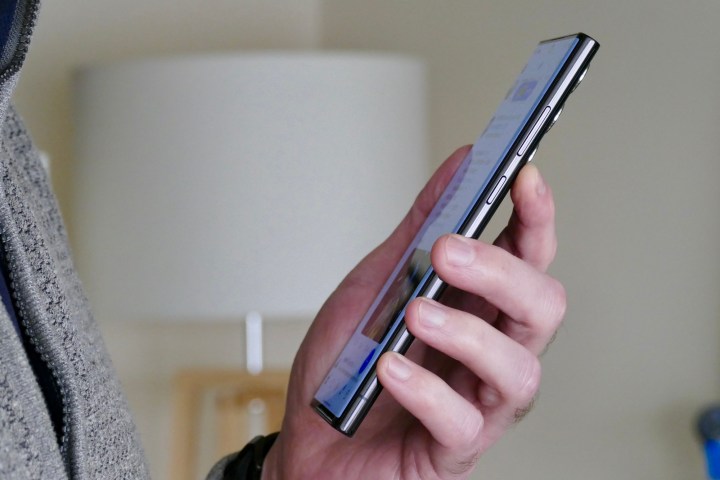
Call quality has been good, but the vibration alert for incoming notifications is quite weak, and I found myself missing calls and messages with the volume off. There’s an option to increase the level of vibration, but it’s at maximum by default. I have also noticed the signal strength, according to the reception bars, isn’t as strong as I’d expect. It has failed to connect to a 4G network in poor coverage areas, where other phones have still managed to pull in a signal. It’s something I’ll continue to monitor, as it may change after release with a software update from Samsung or my carrier.
Battery and charging
The battery inside the S22 Ultra is rated at 5,000mAh, and Samsung has equipped the phone with support for 45-watt fast charging, but does not include the relevant charging block inside the box. Buy one from Samsung and it’ll cost $50, but what if you use another charger? I’ve used the more versatile $40 Elecjet X21GaN Pro charger, which supports the correct Power Delivery PPS standard needed for Samsung’s Super Fast Charging system to activate.

Sure enough, the phone’s screen shows Super Fast Charging is active, and the S22 Ultra took 59 minutes to reach 100% capacity from 3%. This is fast, but nothing special, considering OnePlus will halve that charge time on the OnePlus Nord CE 2, which costs much less than the Galaxy S22 Ultra. If you use a charger without Power Delivery PPS or a smaller wattage, expect the charge time to increase, but not by much. Tests show it’ll be around 70 minutes, so there’s little need to rush out and buy a new charger in the hope of lightning-fast charging. The Galaxy S22 Ultra also supports 15W wireless charging.
How long does the battery last? So far, after a rocky first couple of days while the phone adjusted itself to my use, it has leveled out to have enough power for a full day of heavy use, and two days of moderate use. By moderate, I mean not playing games, streaming video or music for hours, or constantly switching between a 4G and 5G connection. I have been testing the phone with its screen at full resolution and the dynamic refresh rate active, so if you drop the resolution down to FHD+, you may improve results.
Price and availability
The Samsung Galaxy S22 Ultra costs $1,199 for the 8GB/128GB version. If you want more storage, you’ll pay $1,299 for a 12GB/256GB model, $1,399 for a 12GB/512GB model, or $1,599 for the top 12GB/1TB version. We’d suggest choosing carefully as there is no expandable storage space, so should you run out, you’ll have to delete content or apps, or transfer them to cloud storage.
You can see the Phantom Black model in our photos here, but it’s also available in burgundy, green, or Phantom White. Order from Samsung, and there’s a further choice of three exclusive colors: Graphite, Sky Blue, or red.
In the U.K., the S22 Ultra costs 1,149 British pounds for the 8GB/12GB model, 1,249 pounds for the 12GB/256GB model, 1,329 pounds for the 12GB/512GB model, and 1,499 pounds for the 12GB/1TB version. It’s available in the same color choices as above.
Our take
Unquestionably, the Samsung Galaxy S22 Ultra is the most multipurpose smartphone you can buy today, and regardless of what you want to do with your phone today, tomorrow, or in two years time, its astonishing ability and varied feature set will have you covered. There’s real value in buying a phone so capable, as although the initial outlay for the Galaxy S22 Ultra is high, there won’t be any real need to replace it for the foreseeable future.
The evidence is there in our comparisons between it, the Galaxy S21 Ultra, and the Galaxy Note 20 Ultra. Upgrading to the S22 Ultra from either of these is unnecessary. Because the three are still so close in ability, that’s unlikely to drastically change this time next year either, and as the Galaxy S22 Ultra combines what’s great about both these phones, expect it to be even longer-lasting.
Yes, you’ll have to manage a massive, heavy phone with charging that isn’t as fast as the competition, and buying a version with the most storage you can afford is prudent, but otherwise, the Galaxy S22 Ultra is one of the safest, most forward-looking tech purchases you can make at the moment.
Is there a better alternative?
Want a big smartphone with a brilliant camera? If you’re sticking with Android, the Google Pixel 6 Pro ticks those boxes, and if you don’t mind switching to Apple, then take a look at the iPhone 13 Pro Max.
What if you own the Galaxy S21 Ultra or the Galaxy Note 20 Ultra? Is it worth upgrading? Probably not, unless there is something wrong with your phone. The camera is not a huge advancement over the S21 Ultra’s, and while the S Pen has lower latency than the one in the Note 20 Ultra, if you’re satisfied, there’s little reason to move on. We’d suggest waiting.
How long will it last?
The Galaxy S22 Ultra is going to last you years. First off, it’s tough. The same Armor Aluminum metal used on the Galaxy Z Fold 3 and Z Flip 3 has been used for the metal chassis, while Gorilla Glass Victus+ covers the rest. The phone also has an IP68 water resistance rating. It’s very good news on the software side, too, as Samsung promises four Android version updates and five years of security updates.
That’s before you consider the technology inside it, which is as up-to-date as you can get. Then there’s its massive ability, whether it’s taking photos, playing games, or using it for work. It’s an expensive smartphone, but you could easily use it for the next three or four years and not worry about upgrading.
Should you buy it?
Yes. This immensely powerful smartphone will last you for years.



